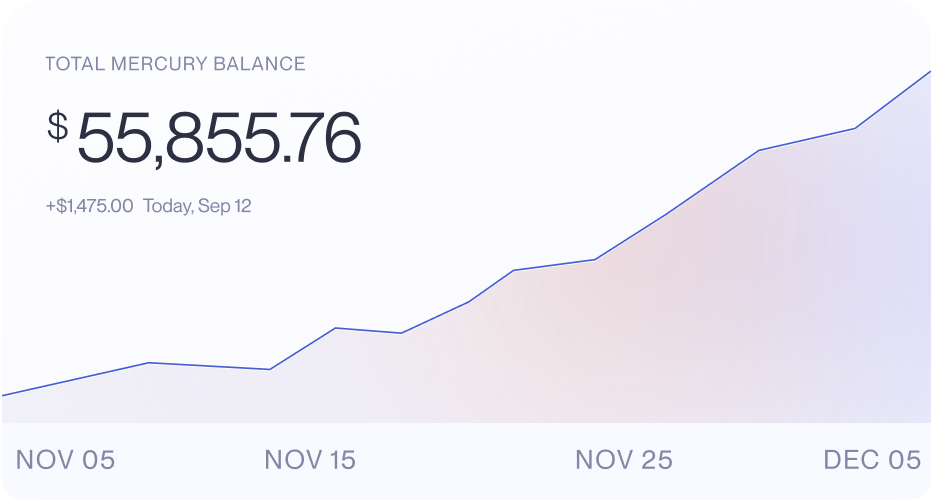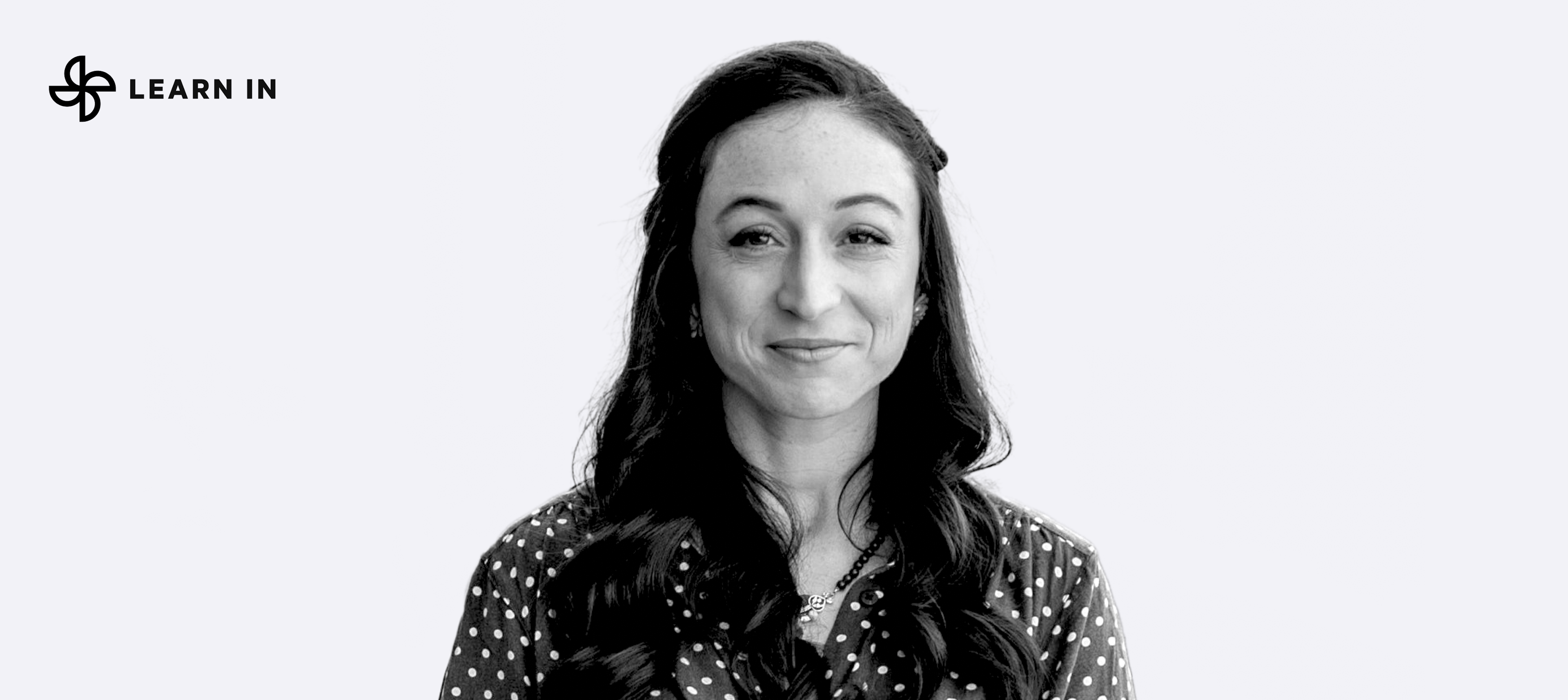
Each month, we spotlight a different founder in the Mercury community, giving them the space to share their story of entrepreneurship, a few fun facts, and some inspirational quotes for the greater good. This month, we chatted with Yael Kaufmann, co-founder and COO of Learn In, recently acquired by Degreed.
Q: What’s your elevator pitch for Learn In?
A: We help companies strategically close their skill gaps by offering their employees inclusive education benefits and building academies to enable cohort-based learning opportunities.
Q: How did you and your co-founders come up with the idea?
A: We spend over $350B globally on all things corporate training. That’s up 30% over the last decade. Over the same period of time, the percentage of CEOs worried about the availability of skills has also increased from 53% in 2012 to 79% just a few years ago. We are spending more money on the problem and yet the skills gap is large and growing — and inhibiting businesses from being able to innovate and do what they need.
You can't hire and fire your way to closing the skills gap — companies have tried and failed — so what is it that you can do, and how can we encourage companies to invest in their talent? It’s almost inevitably ROI-positive to invest in your people, so why is it that more companies and employees aren’t doing this?
What we identified is that there are a few key barriers to learning and skill-building, time and money chief among them. When you think about these barriers, they also reinforce structural inequities. Guess who especially doesn’t have time to learn? People who are single parents, have a long commute, are primary caregivers, or have a second job. Money — people don’t all necessarily have the ability to pay out of pocket and wait six months to get reimbursed by their employers. So offering prepaid learning stipends is more inclusive than tuition reimbursement. These are some of the things we set out to solve with our platform.
Q: What's a hurdle you encountered, and how did you and your team overcome it?
A: We launched our company in January 2020, just days before shelter-in-place orders were going into place around the country. I will never forget when we raised our seed round — refreshing our Mercury page and seeing that first million, then the second million, and waiting for that third million to hit (it did).
The approach that we took at that time was to be incredibly scrappy. We burned very little and were exceptionally customer-focused. We did hundreds of discovery calls with our buyers and users, trying to understand at a deep level: what is the underlying problem that we want to solve?
Once we were able to understand that, we were able to really build out our team, build out our product, sell to our first few enterprise clients, and head into 2022 swinging to raise a great Series A.
Q: How has Learn In changed along the way?
A: The biggest change is that we recently announced our acquisition; we are now officially a fully-owned subsidiary of Degreed!
When you think about where your company is and how you can potentially expand your impact, the ability to make one plus one equal three is part of what you want to look for in M&A.
We had just raised a Series A, and at two years in, we weren’t looking to sell. But when we were approached by Degreed, there were a few different considerations in the mix. Degreed has an installed base of 400 customers and 8M users so the opportunity to expand our impact, accelerate our growth, and strive for that “bigger whole than the sum of its parts” is something that we were excited about. We’re glad to have found that strategic partner and home to build our businesses together.
Q: How do you balance short-term goals and long-term vision for your company?
A: Focus. You have to be able to ruthlessly prioritize when you think about your short-term goals, while maintaining a long-enough-term vision where you’re keeping an eye on the landscape and on what competitors are doing so that you’re aware of what’s happening in the market. That way, you’re not so laser-focused that you can’t move nimbly if you need to.
Q: What’s something unconventional about your journey to becoming a founder?
A: I started my career as an investor in private equity. My journey took me through early- and late-stage investing and operating before I found my calling as a founder. Along the way, I’ve learned invaluable lessons and skills, but in general, I’ve always wanted to solve problems — and to build businesses at scale that solve problems that make a difference in the world.
As an investor, I did my best to help people from underrepresented groups, like female founders and underrepresented minorities, understand how to navigate the complicated VC landscape that is notorious for underserving and underestimating people who often end up proving everyone wrong.
In general, I believe you can be a founder from any background. My parents were immigrants from the former Soviet Union, so I grew up in a household that very much valued education. Growing up, I went to school seven days a week — Russian school on Saturdays and Hebrew school on Sundays — so education has always been near and dear to my heart.
The path to becoming a founder in education was perhaps in some ways inevitable, but it wasn’t necessarily one that I expected to set out on. Every day I drink coffee from my favorite mug, given to me by a former student of mine fifteen years ago. I taught and tutored for a decade. That's how I made my money growing up, so for me, it’s always been about the impact you can have on other people — and expanding access to education as a means of expanding access to opportunity.
Q: How has your experience as a former investor informed your perspective as a founder?
A: The biggest value was knowing how the other side is approaching the fundraising conversation. Oftentimes, founders — particularly first-time founders — are intimidated, nervous, or just unsure of how to play the game.
In general, a VC is trying to find the founders who have the best chance at success. There are so many founders who are building fantastic businesses that may or may not appear to be “a fit” for a particular investor but still deserve to be funded. Finding the right fit when lining up those sources and uses of capital is key.
I spent some time as a VC and impact investor, so I know that there are different types of funds out there with different mandates, from sector-specific focus areas, stages, and impact thresholds — all of these things are considerations. I think having a view of that landscape and how to approach those conversations in the process was by far the most valuable piece of that journey.
Q: If you weren’t in the education industry, what industry would you be in?
Climate is the first thing that comes to mind. It’s just such a big problem area and it’s something that will affect all of us. In general, I care deeply about solving problems that matter and climate is an area that I will probably have an eye on for a long time — as there is substantial progress that still needs to be made.
Being able to have the lens of “there are big problems that need to be solved and there is a tremendous amount of economic opportunity in solving those problems” and having that permeate the investor, founder, and operator landscape — I think that will drive compelling market-based solutions that I would love to be part of, whether as a funder or advisor.
Q: Who was the first founder you looked up to?
A: There are so many founders that I admire and respect who have built big businesses and become household names. But when you say “founder that I looked up to,” that feels more personal. The first person who came to mind was actually Katrina Lake, the founding CEO of Stitchfix. I will never forget seeing a picture of her holding her little toddler with her team at the NASDAQ and it was the first time that I could see myself in those shoes. A fellow HBS alumna who built this business, who was taking it public, and had a kid. I’m not a mom yet, but it was inspiring.
The more that we shine a light on these people who are breaking barriers and setting that path for everyone else to follow, the more we’ll be able to see more female founders and people from underrepresented groups make their way through the industry.
Q: What’s the best advice you’ve ever received?
A: I’m gonna cheat and give you two, one from each of my parents.
My mom said, “You’re paid to learn,” back when I was grinding it out in the early days of private equity. The fact that you get to learn about different industries, different companies, what makes a good business, all of that was helpful for reframing it. It’s not just work, but the ability to learn — and the ability to learn on the job is critical for success.
And the other is something my dad says, which is: “Don’t hold it close to your heart.” Don’t let things that people say get to you at a level that really cuts deep. There are always going to be haters, there are always going to be people who are naysayers and you just have to be able to let things bounce off and move on with your day, and with your life.
Q: Describe entrepreneurship in three words.
A: Scrappy, roller coaster, focus.
Q: Do you have a favorite Mercury product or feature?
A: Just the fact that it’s free, easy banking
I’ll give you another one, too, as it’s tough to pick just one: the Mercury Venture Debt product. We had signed a term sheet with Mercury Venture Debt — a phenomenal facility. We were really excited about it and the whole team was great — just weeks before we got the offer to be acquired and no longer needed the venture debt. So it was unfortunate timing from the perspective that it was a really great vehicle, and I was really excited about it!
Q: Coffee or tea, and what brand?
A: Partners Coffee, Brooklyn blend. It’s perfect for cold brew and we are a cold brew household so I brew it at home.
Q: Slack or email?
A: Slack.
Q: Early bird or night owl?
A: Night owl.
Interested in being featured as a founder spotlight in an upcoming issue of The Messenger? Sign up for a Mercury account, then submit your company for consideration here.
